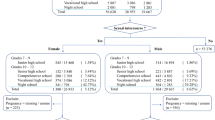Abstract
The objective of this study was to explore whether the time at which sex education was provided had any impact on reported cases of unintended pregnancies. A cross-sectional survey of secondary school students and their teachers was conducted using self-administered questionnaires. The participants were 1,234 students aged 14–17 years and 46 teachers in 5 secondary schools in South Eastern Nigeria. The outcome measures were reported pregnancies within the last 3 years by type of school and class level; class level at the time of receiving sex education at school; and age at the time of receiving sex education at home. In all schools, sex education was provided at all the junior and senior secondary school levels (JSS and SSS, respectively). Overall, reported cases of unintended pregnancies were highest among the junior students. In the private schools, four in ten teachers reported pregnancies among JSS 3 students. Almost four in ten teachers in public schools reported pregnancies among JSS 2 students. Of all the students, about three in ten reported pregnancies among JSS 2 and 3 students respectively. At home, sex education was provided at the mean age of 16 years (SD ±2.2). All participants cited financial need and marital promise as major predisposing factors. About four in ten students did not use contraceptives during their first sexual experience. This study highlights the need to introduce sex education much earlier, possibly before the JSS levels. At home, sex education may have greater impact if provided before the age of 14 years. Efforts should be made to address the factors predisposing to teenage pregnancy.
Similar content being viewed by others
References
Okonofua, F. E., Odimegwu, C., Ajabor, H., Daru, P. H., & Johnson, A. (1999). Assessing the prevalence and determinants of unwanted pregnancy and induced abortion in Nigeria. Studies in Family Planning, 30(1), 67–77.
Country brief series no. 2 (2004) Youth reproductive health policy. Nigeria: Advocacy and Strategic Planning for Youth Reproductive Health in Edo State. Policy Project. http://www.policyproject.com/pubs/YRHCBS/Nig_YRH.pdf.
Grunseit A (2008) Impact of HIV and sexual health education on the sexual behaviour of young people: a review update. Available at: http://data.unaids.org/Publications/IRC-pub01/JC010-ImpactYoungPeople_en.pdf. Accessed 10/08/2008.
Slap, G. B., Lot, L., Huang, B., Daniyam, C. A., Zink, T. M., & Succop, P. A. (2003). Sexual behaviour of adolescents in Nigeria: cross-sectional survey of secondary school students. BMJ, 326(7379), 15–18.
Odimegwu, C. O., Solanke, L. B., & Adedokun, A. (2002). Parental characteristics and Adolescent Sexaul behavior in Bida Local government area of State, Nigeria. Afr J Reprod Health, 6(1), 95–106.
Anochie, I. C., & Ikpeme, E. E. (2001). Prevalence of sexual activity and outcome among female secondary school students in Port Harcourt, Nigeria. Afr J Reprod Health, 5(2), 63–67.
Kirby, D., Short, L., Collins, J., Rugg, D., Kolbe, L., Howard, M., et al. (1994). School-based programs to reduce sexual risk behaviors: a review of effectiveness. Public Health Reports, 109(3), 339–360.
Madise, N., Zulu, E., & Ciera, J. (2007). Is poverty a driver for risky sexual behaviour? Evidence from national surveys of adolescents in four African Countries. Afr J Reprod Health, 11(3), 83–98.
World Health Organization (2002) The World Health Report 2002: Sexual and reproductive health. Accessed 06/07/2008. Available at: http://www.who.int/whr/2002/chapter4/en/index5.html.
Ilika, A., & Igwegbe, A. (2004). Unintended pregnancy among unmarried adolescents and young women in Anambra State, South East Nigeria. Afr J Reprod Health, 8(3), 92–102.
Adegbenro, C. A., Adeniyi, J. D., & Oladepo, O. (2006). Effect of training programme on secondary schools teachers’ knowledge and attitude towards reproductive health education in rural schools IIe-Ife, Nigeria. Afr J Reprod Health, 10(2), 98–105.
Bailey, P. (2005). Teenage pregnancies: is the high rate of teenage pregnancy and parenthood in the UK a public health problem? J Fam Plann Reprod Health Care, 31(4), 315–319.
Boyer, D., & Fine, D. (1992). Sexual abuse as a factor in adolescent pregnancy and child maltreatment. Family Plann Perspect, 24(1), 4–11. 19.
Flanagan D, Mahler H (2008) How to create an effective peer education project: guidelines for AIDS prevention projects. Available at: http://www.fhi.org/NR/rdonlyres/efec2fjcedftpcqabrs5oluwwvdu5jofqmwg6hwjkwrl7gsgpzjt24ceuyccva4vvsbgydx3fwgwdo/createeffectpeereducation.pdf. Accessed 13/07/2008.
DiCenso, A., Guyatt, G., Willan, A., & Griffith, L. (2002). Interventions to reduce unintended pregnancies among adolescents: systematic review of randomized controlled trials. BMJ, 324(7351), 1426–1430.
Acknowledgments
This research received no grant from any funding agency. We thank the students, teachers and principals/proprietors of secondary schools that participated in this study in Anambra state, Nigeria for their invaluable contributions towards this work.
Author information
Authors and Affiliations
Corresponding author
Rights and permissions
About this article
Cite this article
Ochiogu, I.N., Miettola, J., Ilika, A.L. et al. Impact of Timing of Sex Education on Teenage Pregnancy in Nigeria: Cross-sectional Survey of Secondary School Students. J Community Health 36, 375–380 (2011). https://doi.org/10.1007/s10900-010-9318-6
Published:
Issue Date:
DOI: https://doi.org/10.1007/s10900-010-9318-6



